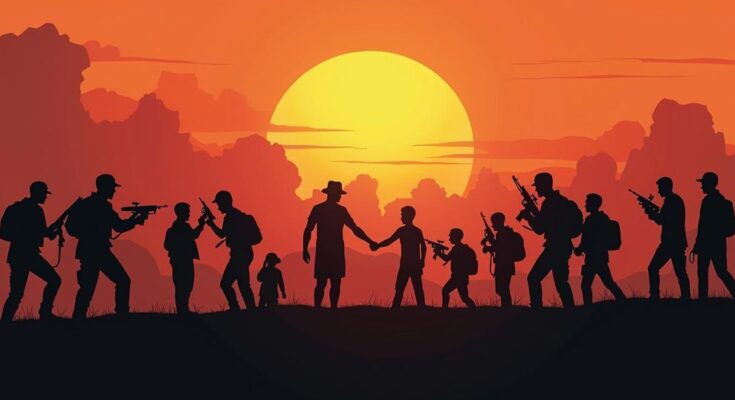The assassination of Hassan Nasrallah by Israel marks a significant escalation in the conflict with Hezbollah. This event could potentially widen the conflict, involving Iran and the US. Hezbollah, despite significant losses, vows revenge with its military capabilities. Iran, mourning the loss, may mobilize allied militias for retaliatory actions while avoiding full-scale war. Israel remains committed to its military objectives, preparing for potential ground operations against Hezbollah, despite the challenges posed by the group’s preparedness.
The recent assassination of Hassan Nasrallah, the enduring leader of Hezbollah, by Israeli forces marks a significant escalation in the ongoing conflict between Israel and the Lebanese militant group. This critical development has the potential to propel the region towards a broader and more devastating conflict involving both Iran and the United States. Where the situation progresses from this moment hinges on three primary considerations: the actions of Hezbollah, the response of Iran, and the strategic maneuvers of Israel. Hezbollah, currently reeling from substantial losses, finds its leadership severely compromised following the assassination of Nasrallah along with the deaths of numerous high-ranking commanders. The group has faced intense bombardment that has dismantled its communication infrastructure and led to the destruction of many of its weapons caches. As noted by Middle East security analyst Mohammed Al-Basha, “The loss of Hassan Nasrallah will have significant implications, potentially destabilising the group and altering its political and military strategies in the short term.” However, Hezbollah remains vehemently opposed to conceding to Israeli demands. The organization possesses a formidable number of fighters, including many who are battle-hardened veterans from the Syrian conflict, and there is considerable pressure from within its ranks to retaliate against Israel. Although Hezbollah’s long-range missile capabilities are intact, any large-scale offensive might provoke a vigorous Israeli response that could devastate Lebanon’s infrastructure and potentially escalate into a regional conflagration involving Iran. On the Iranian front, the assassination poses a dual blow to their regional ambitions. Iran has declared five days of mourning in response and is reportedly taking defensive measures to protect its leadership, particularly Ayatollah Ali Khamenei. The Iranian regime has thus far refrained from taking retaliatory actions following an earlier blow in July with the assassination of Hamas’ political chief, Ismail Haniyeh. The current circumstances, however, may compel Iranian hardliners to contemplate retaliatory tactics. Iran maintains numerous allied militia groups across the Middle East that constitute the so-called “Axis of Resistance,” such as the Houthis in Yemen and various factions in Syria and Iraq. If tasked with retaliating, these groups could increase their assaults on Israeli positions and American bases in the region, but Iran will likely calibrate its response to avoid igniting a conflict it cannot manage. As for Israel, the assassination has affirmed the nation’s resolute commitment to its military objectives. The Israeli government has indicated that it will not entertain a ceasefire for the proposed 21 days, aiming instead to capitalize on what they believe is Hezbollah’s weakened state. Despite the challenges of dismantling Hezbollah’s missile capabilities entirely, Israel’s Defense Forces (IDF) have commenced infantry training operations close to the Lebanon border, preparing for a potential ground invasion. Hezbollah’s extensive preparatory training over the past 18 years complicates such an incursion, as evidenced by Nasrallah’s assertion that an Israeli advance into southern Lebanon would present a “historic opportunity” for the group to retaliate effectively. While initial military operations may proceed smoothly for Israel, the subsequent withdrawal could prove prolonged and fraught with difficulties, similar to the situation in Gaza.
The conflict between Israel and Hezbollah has a long and tumultuous history, with numerous engagements leading to significant casualties and destruction on both sides. The assassination of Hassan Nasrallah represents a pivotal moment, heightening tensions not only between these two entities but also involving Iran, which considers Hezbollah a crucial ally in its regional strategy. This conflict draws in various international players, including the United States, which historically supports Israel, complicating the possibility of a swift resolution. The repercussions of this assassination could lead to unprecedented destabilization in the Middle East, with potential ramifications on broader geopolitical alliances.
In conclusion, the assassination of Hassan Nasrallah signals a critical juncture in the Israeli-Hezbollah conflict, with various potential outcomes hinging on the responses from Hezbollah, Iran, and Israel. Hezbollah is poised for revenge and has significant military resources to draw upon, while Iran may leverage its network of allied militias to respond cautiously yet effectively. For its part, Israel seeks to suppress Hezbollah’s military capabilities entirely, likely considering ground operations essential to achieving this goal. The situation remains fluid, and the decisions made by these parties in the wake of this escalating conflict will be pivotal in shaping the future stability of the region.
Original Source: www.bbc.com




